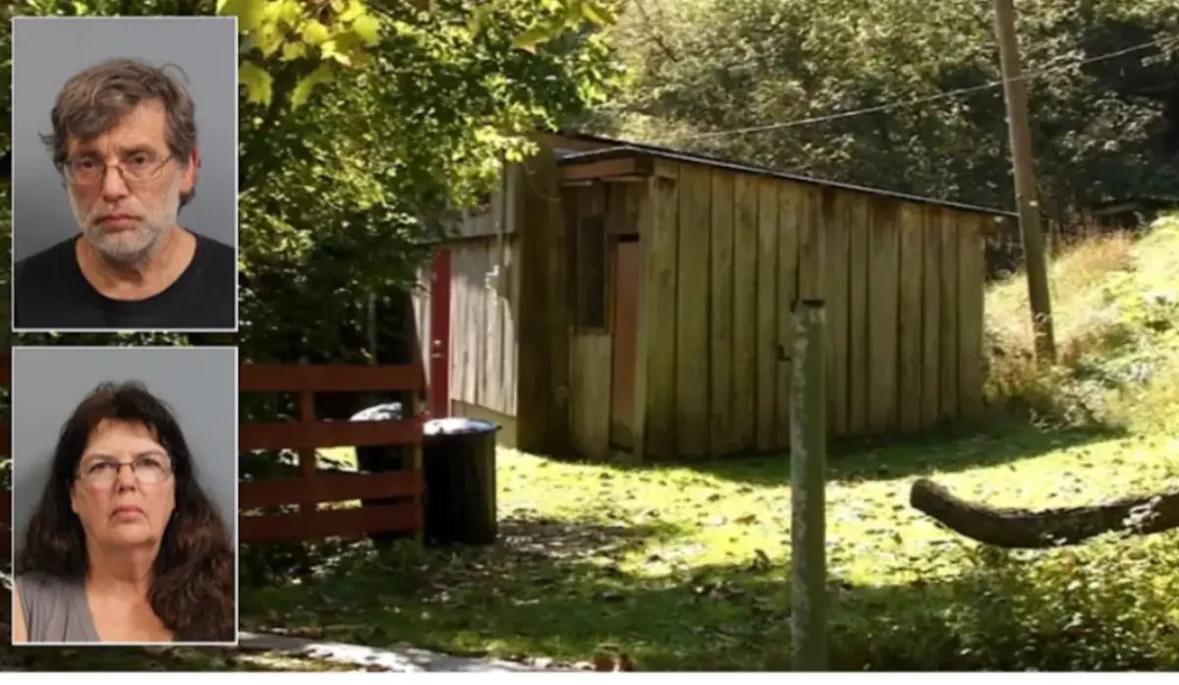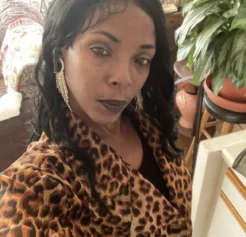A white couple from rural West Virginia is back behind bars after a judge revoked the initial bond and raised it to $500,000 apiece — more than double the amount they faced last year when police arrested the pair on charges of locking their adopted Black children in a barn and forcing them to work as “slaves.”
Donald Ray Lantz, 63, and Jeanne Kay Whitefeather, 62, both of Sissonville, were ordered to reappear in Kahanwha County Court on June 11, more than eight months after each posted a $200,000 bond following their arrests in October.
At the time, police conducting a wellness check at the Cheyanne Lane home were shocked to discover two of the couple’s five adopted children living in deplorable conditions, padlocked inside a ramshackle storage shed on the back of the property, which had no working lights or running water.

The abused children were identified only as a 14-year-old boy and a 16-year-old girl.
A third child, identified as a 9-year-old girl, was confined to a loft inside the main house, away from the presence of the adults and isolated from her other siblings, police said, according to reports.
At the initial court hearing in October, Lantz and Whitefeather pleaded not guilty, and Kanawha County Circuit Judge Maryclaire Akers set bond at $200,000 each.
The couple made bail in February, and they were released to await trial.
They remained free for several months, but in May, a grand jury indicted the couple on more than a dozen new charges, the most serious being human trafficking of a minor child, which prompted the judge to revoke the lower bond, ordering the couple held in lieu of a million dollars.
“Along with human trafficking and neglect with serious risk of bodily injuries or death, I don’t find the bond to be sufficient,” Akers told defense attorneys during the second bond hearing.
The upgraded charges include alleged use of a minor child in forced labor, child neglect creating a substantial risk of serious bodily injury or death, as well as false swearing and potential civil rights violations based on color, race, or ancestry, according to court documents.
The indictment suggests that three of the five adopted children were Black and that the human rights charges stemmed from those children being specifically targeted and forced to work because of their race.
A small toilet seat torn from an RV was placed in the barn for the children to share whenever they had to go to the bathroom, police said.
During the second bond hearing, Whitefeather explained that the barn where the children were found was a “teenage clubhouse” and maintained that the children were not actually locked inside.
But neighbors disputed this claim, saying “the children were forced to perform farm labor and were not permitted inside the residence,” the indictment states.
When rescued, the 16-year-old girl informed deputies that they had been locked in the barn for approximately 12 hours and had last eaten around sunrise. According to Burdette, the children locked inside could not exit the shed and deputies had to force themselves into the shed.
Deputy H.K. Burdette entered the shed, and they immediately noticed a disturbing smell and a wave of heat due to the lack of circulating air.
Both children appeared feral and dirty, reeking of body odor, while the boy had “open sores on his bare feet,” according to court papers.
The children told investigators they were forced to sleep on a bare concrete floor with no mattress or covers.
Police remained at the house for three hours before Lantz arrived home with an 11-year-old boy.
When authorities checked the home for other potential victims, they found the 9-year-old holed up in the loft, and Lantz was placed under arrest.
About an hour later, Whitefeather returned home and guided deputies to another 6-year-old girl who was visiting with another couple from their church.
During the latest bond hearing, Kanawha County prosecutors argued that the couple’s original cash bonds were likely obtained through trafficking profits, pointing to the fact that the couple produced the $400,000 bond despite a lack of obvious means to do so.
At the same proceeding, Lantz and Whitefeather claimed they possessed no income or assets, raising questions about the source of the funds for their bond.
Kanawha County Assistant Prosecuting Attorney Christopher Krivonyak characterized the money posted for the couple’s release as “contraband directly or indirectly used or intended for use” to violate human trafficking laws.
In early February, the couple sold an 80-acre ranch in Tonasket, Washington, for $725,000, and days later, Whitefeather’s brother, Marcus Hughes, posted two bonds for $200,000 to release the couple from the South Central Regional Jail.
Krivonyak said they have since sold the Sissonville home, where they were arrested for $295,000.
All those funds have been seized by the court as potential profits from human trafficking, rendering them inaccessible to the defendants.
Prosecutors argued that even if the bond money came from legitimate sources, its use was intended to further human trafficking and forced labor operations.
Akers also remarked that the case was unlike any other she had heard during her entire career as a judge.
“It alleges human trafficking, human rights violations, the use of forced labor,” Akers said, according to reports. “Human rights violations specific to the fact that these children were targeted because of their race and they were used basically as slaves from what the indictment alleges.”
Both Lantz and Whitefeather pleaded not guilty to the new charges in the indictment, however, they remain in jail as they have been unable to meet the higher bond amount.
Their next court appearance is scheduled for Sept. 9.
“You heard in the testimony about what these children were going through and it’s horrifying and despicable,” Kanawha County Assistant Prosecuting Attorney Debra Rusnak said, according to Metro News Television. “There’s no other way to describe it.”


